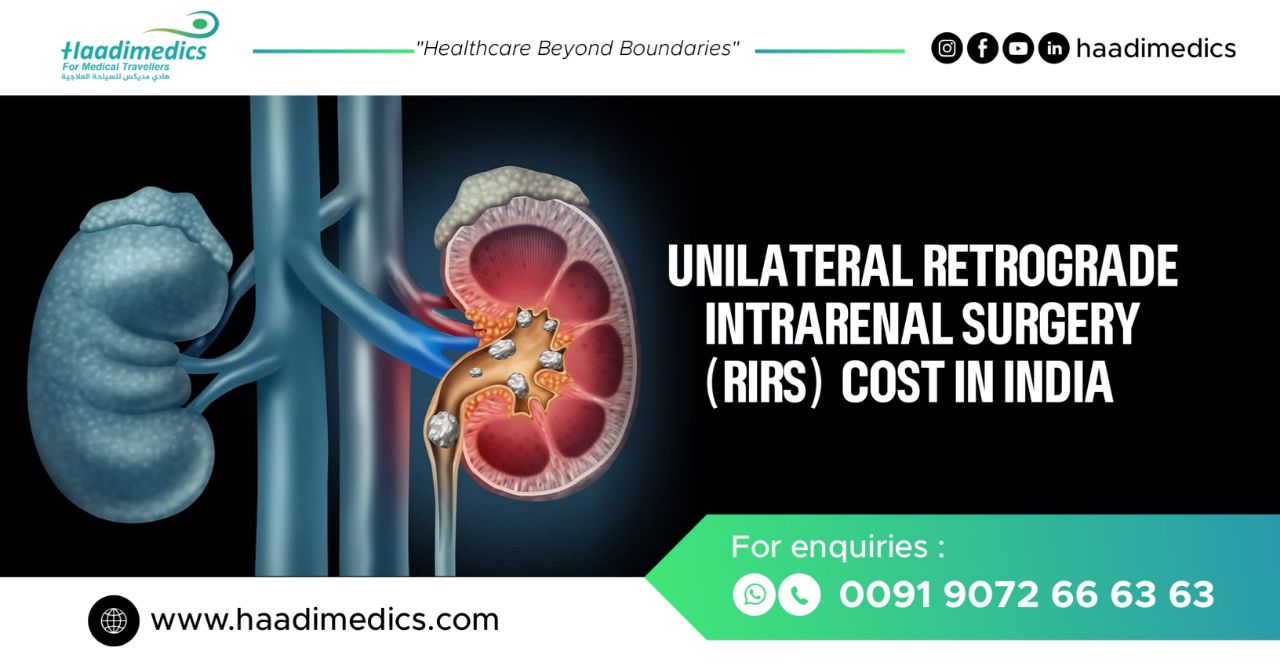In recent years, India has emerged as a leading destination for medical success, offering advanced treatments at competitive prices. One such procedure gaining prominence is RIRS (Retrograde Intra-Renal Surgery).
India has made remarkable strides in urological procedures like RIRS, owing to its great medical infrastructure, skilled surgeons, and cost-effective healthcare solutions. With a commitment to delivering world-class treatment, India has garnered international recognition for its success in performing RIRS surgeries with high precision and favorable outcomes.
What is RIRS?
RIRS, or Retrograde Intra-Renal Surgery, is a minimally invasive surgical technique used to treat kidney stones located within the kidney or upper urinary tract. Unlike traditional open surgery, RIRS involves accessing the kidney through the urinary tract using a flexible ureteroscope, thereby eliminating the need for incisions and reducing post-operative complications.
Why is it done?
RIRS is primarily performed to remove kidney stones that are too large to pass naturally or are causing symptoms such as severe pain, urinary tract infections, or obstruction of urine flow. By using a specialized laser fiber inserted through the ureteroscope, the surgeon can fragment the stones into smaller pieces, which can then be flushed out of the body or removed with additional tools.
Risks
While RIRS is considered a safe and effective procedure, it carries certain risks, including bleeding, infection, injury to surrounding structures, urinary tract injury, and residual stone fragments. Patients should discuss these risks with their healthcare provider and address any concerns before undergoing the procedure.
Preparation
Preparation for RIRS involves a comprehensive evaluation by a urologist, including medical history review, physical examination, and imaging studies such as CT scans or ultrasound to assess the size, location, and number of kidney stones. Patients may be advised to stop certain medications, undergo blood tests, and maintain adequate hydration before surgery.
Procedures
During RIRS, the patient is placed under general anesthesia to ensure comfort and immobility. The surgeon inserts a flexible ureteroscope through the urethra and bladder and navigates it into the kidney. Using real-time imaging, the surgeon identifies the kidney stones and uses a laser fiber to break them into smaller fragments. The fragmented stones are then either removed using a special basket-like device or allowed to pass naturally through the urinary tract.
Best Hospitals in India for RIRS
• BLK Super Speciality Hospital, New Delhi
• Indraprastha Apollo Hospital, New Delhi
• Artemis Hospital, Gurgaon
• Manipal Hospital (Old Airport Road) Bangalore
• Apollo Hospitals, Greams Road, Chennai
• Kokilaben Dhirubhai Ambani Hospital, Mumbai
Best Doctors for RIRS
• Dr. Ravikumar Karunakaran
• Dr. RCM Kaza
• Dr. Vikram Sharma
• Dr. Rahul Gupta
• Dr. Ashish Sabharwal
• Dr. Anant Kumar
Top Nations in this Field
India stands among the top nations in the field of RIRS surgery, alongside countries like the United States, Germany, the United Kingdom, and Singapore, which also offer advanced urological treatments and specialized care for kidney stone management.
Cost Comparison
India – USD 1300
Germany – USD 2000
Turkey – USD 2800
USA – USD 3000
FAQ
1. How long does RIRS surgery typically take?
RIRS surgery duration varies depending on the size and number of kidney stones but generally lasts between 1 to 2 hours.
2. Will I need to stay in the hospital overnight after RIRS surgery?
Most patients can return home the same day after RIRS surgery, although some may require an overnight hospital stay for observation and pain management.
3. What dietary modifications will I need to follow after RIRS surgery?
Patients may be advised to increase fluid intake, avoid foods high in oxalates, and follow a balanced diet rich in fruits, vegetables, and whole grains to prevent stone recurrence.
4. How soon can I resume normal activities after RIRS surgery?
Patients can typically resume light activities within a few days after RIRS surgery and gradually increase activity levels as tolerated. Strenuous activities should be avoided for about 1 to 2 weeks.
5. Are there any restrictions on driving or returning to work after RIRS surgery?
Patients should refrain from driving until they are no longer taking prescription pain medications and feel comfortable and alert behind the wheel. Return to work timing depends on individual recovery and job requirements.
6. What are the chances of stone recurrence after RIRS surgery?
While RIRS effectively removes existing kidney stones, there is a small risk of stone recurrence, especially if underlying factors like diet and hydration are not addressed. Regular follow-up appointments and lifestyle modifications can help prevent stone recurrence.
7. Can RIRS surgery be performed on pregnant patients or those with bleeding disorders?
RIRS surgery is generally not recommended for pregnant patients due to potential risks to the fetus. Patients with bleeding disorders or uncontrolled medical conditions may require additional evaluation and clearance before undergoing surgery.
8. Will I experience pain or discomfort during RIRS surgery?
Patients are under general anesthesia during RIRS surgery and do not experience pain. After surgery, some discomfort in the urinary tract is common and can be managed with pain medications.
9. How soon can I expect to pass any residual stone fragments after RIRS surgery?
Residual stone fragments may pass spontaneously within a few days to weeks after RIRS surgery, depending on their size and location. Your healthcare provider may recommend medications or dietary modifications to facilitate stone passage.
10. Are there any long-term complications associated with RIRS surgery?
While RIRS surgery is generally safe, long-term complications such as ureteral strictures, recurrent urinary tract infections, or kidney damage are rare. Regular follow-up appointments and adherence to post-operative recommendations are essential for monitoring your health and addressing any concerns.


Comments